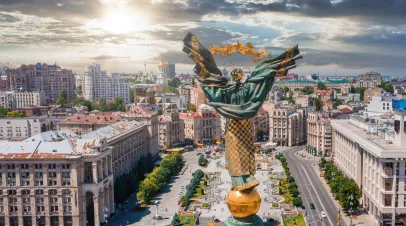Kyiv’s Mobilization for Restoration
Executive Summary
Ukraine has become a different country over the past decade. Compared to the closed post-Soviet oligarchy that it was before the 2014 Revolution of Dignity, Ukraine is now an open society governed as a vibrant democracy that responds to a deep-seated public mandate to chart a European future unencumbered by domestic corruption or Russian imperialism. In collaboration with civil society and with firm support from foreign partners, the Ukrainian government has built a politically independent suite of specialized anti-corruption agencies, with separate bodies responsible for preventing, investigating, prosecuting, and ruling on cases of grand corruption. Kyiv also decentralized governance to empower local communities, restructured entire sectors of the economy plagued by corruption, and instituted world-leading systems of transparency across the political-economic system. Just as much reform still needs to be accomplished over the next decade, as Ukraine was only halfway through a generational process of permanently uprooting oligarchy when Russia sought to put an end to the progress Ukrainian democracy was making by fully invading the country in February 2022.
While impressing the world with its ability to mobilize forces capable of fending off Russia’s far larger military, Kyiv has at the same time continued its anti-corruption journey—notwithstanding some notable setbacks to public transparency under martial law. The Ukrainian government has channeled the reform dynamism of the past decade into planning for a transparent and accountable process of recovery and reconstruction.
In preparation for the influx of the hundreds of billions of dollars in foreign aid needed to rebuild Ukraine—the price tag driven up by the Russian war crime of targeting civilian infrastructure—Ukraine has undertaken a sweeping reorganization of the departments and agencies responsible for restoring national infrastructure. To support accountability and coordination, several existing institutions have been merged and reorganized into new bodies:
-
The Ministry for Restoration, led by Deputy Prime Minister Oleksandr Kubrakov, represents a merger of the Ministry of Infrastructure and the Ministry of Communities and Territories Development. It oversees national restoration and major recovery projects, from setting strategic plans to maintaining key data ecosystems.
-
The Agency for Restoration, headed by Mustafa Nayyem, is a reorganized form of the State Road Agency, or Ukravtodor, which in the past had been coordinated by the Ministry of Infrastructure and is now coordinated by the Ministry for Restoration. It is the key implementation agency for reconstruction projects and is responsible for organizing and procuring materials and supplies for restoration works.
To organize itself for a modern Marshall Plan, Ukrainian government authorities also established new positions for a deputy prime minister, deputy minister, and deputy oblast heads to enhance coordination and cooperation among other essential ministries—economy, finance, digital, environment, and others—as well as the newly created institutions, regional administrations, the Cabinet of Ministers, and the President’s Office. Some 15 oversight and enforcement bodies will contribute to accountability in recovery and reconstruction, with none more vital for safeguarding the process from corruption than the specialized anti-corruption agencies. The rebuilding of Ukraine could also feature unprecedented transparency if the authorities and donors insist on widespread usage of a new information platform co-designed by Ukrainian civil society and the Ministry for Restoration to manage reconstruction projects and match donors with beneficiaries: the Digital Restoration Ecosystem for Accountable Management, or DREAM. Ukraine is also developing other transparent IT solutions, such as the Register of Damaged and Destroyed Properties.
Ukraine is off to a running start in mobilizing its governing capacities for a transparent and accountable recovery and reconstruction process. This should tee up strong Ukrainian ownership over the process, which is both the right thing—because it is their country—and the key to using rebuilding as a strategic opportunity to deepen critical institutional capacities.
At the same time, Ukraine will require a great deal of international assistance, which should be conditioned upon its continuing to deliver governance reform milestones, starting with the anti-corruption and rule of law benchmarks the EU, IMF, and G7 set over the past fifteen months. In the year ahead, policy priorities for Ukraine and international donors should focus on three areas:
-
Governance Capacity: Donors should work with Ukraine to develop shared reconstruction strategies and plans, and aid in their implementation where they are already developed. Opportunities for corruption that come with such a large concentration of spending will impose a heavy burden on the specialized anti-corruption agencies, which require additional resources and authorities.
-
Transparency: Donors should insist on usage of the DREAM ecosystem and integrate their own procurement data into this and other transparency infrastructure that is already in place or is currently being developed by Ukrainians. Donors should start this now while DREAM is still being finalized and there is still time to modify parameters to maximize international compatibility. Ukraine should reimpose the transparency requirements that went into moratorium under martial law.
-
Accountability: External audit, control, and investigation authorities such as inspectors general at donor agencies need to coordinate international efforts on the ground in Kyiv and deepen collaboration with Ukrainian bodies such as the specialized anti-corruption agencies.
The kind of Ukraine that emerges from this war— the extent to which it will be a robust democracy grounded in the rule of law and ready for integration into Euro-Atlantic institutions—will depend greatly on the way Kyiv and its international partners rebuild the country. Getting this process right will require Ukraine and its foreign partners to build on the solid momentum in Kyiv to deepen governing capacities and ensure transparency and accountability.
RECOMMENDATIONS
GOVERNANCE CAPACITY
Expand AllCoordinate Reforms Through the Multi-Agency Donor Coordination Platform
The Multi-Agency Donor Coordination Platform should assume responsibility for synchronization of reform priorities across international donors and maintain a list of next steps for anti-corruption reforms, starting with the currently unmet benchmarks the EU, the IMF, the G7, and other donor conditions set in the past 15 months. The platform should convene regular virtual meetings of donor staff charged with tracking Ukraine’s anti-corruption reforms, a process that should be informed by technical expertise from the anti-corruption assistance programs that are based in Kyiv and funded by USAID and the EU.
Strengthen Systemic Solutions and Plans
Align with other donors and guard against playing into particular local interests by being mindful of other institutions’ strategy and program documents. These include relevant sectoral strategies developed by the ministries, complex recovery programs, plans for regional recovery and development created by local authorities and administrations, and program reports published by international organizations.
Translate the Principles “Better” and “Green” Into Actionable Statements
For clarity, contextualize principles such as “build back better” or “green recovery” within the specifics of Ukraine’s unique situation. Implementing these general ideas as practical policy measures requires thoughtful interpretation to translate them into specific and tangible actions that resonate with Ukrainians in their current social and economic environment.
Help Build the Capacity of National and Local Institutions
Earmark support for upskilling or retaining essential employees at institutions where capacity has decreased significantly due to wartime conditions. Local authorities in the recently deoccupied and war-affected regions have suffered the most, but at the same time are required to make the most immediate and significant decisions on recovery and reconstruction. Support for these institutions is critical.
TRANSPARENCY
Expand AllUse DREAM
Make participation in DREAM obligatory by (i) immediately including in reconstruction funding agreements a requirement that the receiving party or implementing partner use DREAM, and (ii) eventually integrating DREAM into donor agencies’ internal data systems to track procurement information. To identify any unanticipated opportunities to further improve compatibility between DREAM and donor systems before the system is finalized in the months ahead, donor agencies should move swiftly to engage with RISE Ukraine and the Ministry for Restoration around integration with DREAM.
Support Non-DREAM Transparency Efforts
Build capacity to enhance the transparency of recovery activities that will take place outside of DREAM because they began before DREAM was developed, do not follow the logical structure of a DREAM project, or are financed from the project initiator’s budget—such as humanitarian demining, social support, and support for businesses. Condition non-critical assistance to the return of normal procurement in Prozorro, asset e-declarations, and political parties’ financial reporting.
Prioritize Open Data
Raise with Ukrainian authorities the need to bring back online open data systems that have been removed from public view since February 2022. Condition non-critical assistance upon the reestablishment of these transparency systems and disclosure requirements. Support innovative products that help utilize the full potential of open data.
Invest in Digitalization
Continue to provide resources to digital, transparent, and inclusive state services, just as foreign donor programs such as TAPAS have financed the development of much of Ukraine’s digital infrastructure, including many features in the Diia app, the Open Data Portal, the unified state electronic system in the construction sector, and DREAM. Digitalization needs remain vast.
ACCOUNTABILITY
Expand AllCoordinate International Auditors Through a Kyiv-Based Fusion Cell
To address challenges associated with inspectors general (IGs) at donor agencies sharing information with international counterparts and building up investigative capacity on the ground in Ukraine, the G7 should establish a fusion cell comprised of representatives from donor agencies’ IG, auditor, and investigator offices. While representatives of IGs stationed in the fusion cell would continue reporting to their home agencies, the information sharing initiative should be led by an official reporting to the Multi-Agency Donor Coordination Platform. The fusion cell should be based in Kyiv, potentially onsite with NABU, and include a liaison office and dedicated programming to facilitate collaboration with Ukrainian civil society and investigative journalists.
Support Local Journalists and NGOs
Fund independent media outlets and local NGOs adept at interpreting information about recovery and reconstruction. Concentrate this support in the regions where physical recovery needs will be the greatest, as opposed to in Kyiv, where there are already many capable and well-funded organizations that focus on national-level issues.
Support Further Development of Anti-Corruption Law Enforcement Agencies
Condition assistance upon the implementation of critical reforms to support the specialized anti-corruption agencies. As the G7 and IMF have recommended, SAPO needs improvements in its selection procedures for the head and key officials, more budget and staffing, and independent disciplinary and auditing commissions. As the G7 noted, NABU needs a higher staffing cap, adequate budget, independent wiretapping authorities, and a forensic examination unit. The NACP needs a new head before the incumbent’s four-year term expires in January, and the process of selecting the replacement must be fair, independent, and merit-based.
Support an Independent Judiciary
Condition assistance upon the implementation of the reformed selection procedure for judges of the Constitutional Court of Ukraine, the selection of thousands of judges by the reformed judicial governance bodies, and the establishment of a new court in place of the recently liquidated and corrupt District Administrative Court of Kyiv.
Reform External Oversight Bodies
Improve parliamentary oversight and build the capacity of financial control institutions (the Accounting Chamber and State Audit Service of Ukraine) to accommodate the huge volume of recovery-related work. Reform of these institutions, including furthering their political independence, increasing their human capital and technical resources, and creating new, situation-specific control instruments, is essential to the nation’s recovery.
Download the full PDF >>
BRDO is a leading Ukrainian independent think tank in the field of economic regulation with a focus on implementation. The office was established in 2015 as a non-governmental nonprofit organization to assist the government in carrying out medium- and long-term economic reforms to improve the business environment in conditions of political instability.
The Alliance for Securing Democracy (ASD) at the German Marshall Fund of the United States (GMF) is a nonpartisan initiative that develops comprehensive strategies to deter, defend against, and raise the costs of autocratic efforts to undermine and interfere in democratic institutions. ASD has staff in Washington DC and Brussels, bringing together experts on disinformation, malign finance, emerging technologies, election integrity, economic coercion, and cybersecurity, as well as on Russia, China, and the Middle East, to collaborate across traditional silos and develop cross-cutting frameworks.
This work was produced with the generous support of the Smith Richardson Foundation.
A MARSHALL PLAN FOR UKRAINE
We Need a Marshall Plan for Ukraine.
The Marshall Plan was an audacious, innovative strategy to tackle the most pressing challenges of its time. Breaking Western Europe’s cycle of conflict and rebuilding economies devastated by World War II was an immense task, and the Marshall Plan is a concrete example of the scale of change made possible by imagination, pragmatism, and generosity. GMF’s work carries this spirit into the 21st century.
#UkraineAlliance
GMF is a proud partner of the European Alliance of Cities and Regions for the Reconstruction of Ukraine.





